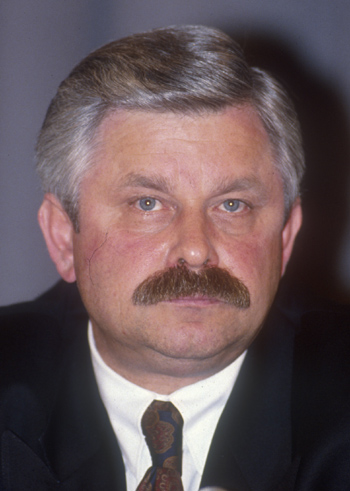- Alexander Rutskoy
Infobox Vice President
name = Alexander Rutskoy Александр Владимирович Руцкой
caption = Photo byMikhail Evstafiev .
order = Vice President of the RFSFR/Russian Federation
term_start =July 10 ,1991
term_end =October 4 ,1993
president =Boris Yeltsin
predecessor = None
successor = Office abolished
birth_date = Birth date and age|1945|9|16|mf=y
birth_place = flagicon|Soviet UnionProskuriv ,Soviet Union
death_date =
death_place =
spouse =
party =
order2 =
term_start2 =
term_end2 =
predecessor2 =
successor2 =Alexander Vladimirovich Rutskoy (Russian: "Александр Владимирович Руцкой") (born
September 16 ,1947 ) is aRussia n politician and a former Soviet military officer. Rutskoy served as the first and onlyVice President ofRussia fromJuly 10 ,1991 toOctober 4 ,1993 , and as thegovernor ofKursk Oblast from 1996 to 2000. In the course of theRussian constitutional crisis of 1993 , he was proclaimed actingpresident of Russia cite news |last=Rosenberg |first=Steven |coauthors= |title=Remembering Russia's civil siege |work=BBC News |publisher=BBC |date=2003-10-03 |url=http://news.bbc.co.uk/1/hi/world/europe/3161002.stm |accessdate=208-04-10] cite news |last=Bendersky |first=Yevgeny |title=CIVIL SOCIETY. WHEN THE IMPOSITION OF WESTERN DEMOCRACY CAUSES A BACKLASH |work=EurasiaNet and PINR |date=2005-02-23 |url=http://www.eurasianet.org/departments/civilsociety/articles/eav022305.shtml |accessdate=2008-04-10] , in opposition toBoris Yeltsin .Early life and career
Alexander Rutskoy was born to a Jewish family in
Proskuriv ,Ukraine . Rutskoy graduated from High Air Force School inBarnaul (1971) and Gagarin Air Force Academy in Moscow (1980). He had reached rank of Colonel when he was sent to theSoviet war in Afghanistan . He was in command of an air assaultregiment and was shot down twice, in 1986 and the second time in 1988 by anF-16 flown by Sqn. Ldr. Athar Bukhari of thePakistan Air Force . Rutskoy was then flying aSu-25 aircraft and entered by mistake Pakistan'sairspace . He managed to eject but was captured by mujahideen, and later released. For his bravery in 1988 he was awardedHero of the Soviet Union . As a soldier and a populist, he was chosen byBoris Yeltsin to be his vice presidential running mate in the 1991 Russian presidential election.Rutskoy was vice president of Russia from
July 10 ,1991 toOctober 4 ,1993 . As vice president, Rutskoy gave a speech inBendery in 1992 advocatingself-determination forTransnistria , delivering a clear message of the moral support for the population.Russian constitutional crisis of 1993
Following the initial period of peaceful collaboration with Yeltsin, from the end of 1992, Rutskoy began openly declaring his opposition to the President's economic and foreign policies and accusing some Russian government officials of corruption. His opposition to Yeltsin became especially clear during the crisis in March, 1993 when the
Congress of People's Deputies tried, unsuccessfully, to remove Yeltsin from the presidency. In subsequent months, Rutskoy himself was accused of corruption by the officials of Yeltsin's government. OnSeptember 1 ,1993 , PresidentBoris Yeltsin "suspended" Rutskoy's execution of his vice-presidential duties, due to alleged corruption charges. The RussianConstitutional Court subsequently declared Yeltsin's decree as unconstitutional.On
September 21 ,1993 , PresidentBoris Yeltsin dissolved theSupreme Soviet , which was in direct contradiction with the articles of SovietConstitution of 1978, e.g.:Article 121-6. "The powers of the President of RSFSR cannot be used to change national and state organization of RSFSR, to dissolve or to interfere with the functioning of any elected organs of state power. In this case, his powers cease immediately."
On the night from
September 21 toSeptember 22 , Rutskoy arrived at the residence of the Russian parliament and, at 12:22 a.m., assumed the powers ofacting president of Russia, in accordance with the above article. He took the presidential oath, and said: "I am taking the authority of President. The anti-constitutional decree of President Yeltsin is annulled." Rutskoy's interim presidency, although constitutional, was never acknowledged outside Russia. After the two-week standoff, and the violence erupting on the streets ofMoscow , onOctober 4 , the Parliament building was taken by Yeltsin's military forces. Rutskoy and his supporters were arrested and charged with organization of mass disturbances. On the same day, Yeltsin officially dismissed Rutskoy asvice president and fired him from the military forces. Rutskoy was imprisoned in the MoscowLefortovo prison untilFebruary 26 ,1994 , when he and other participants of both August 1991 and October 1993 crises, were granted amnesty by the newState Duma .Soon after his release, Rutskoy founded a populist, nationalist party "
Derzhava (Russian: Держава)" (Russian word "Держава" is identical in meaning to a German word "Reich"), which, failed in the State Duma election of 1995, gathering only about 2.5% of the votes, thus not passing the 5% threshold. He decided not to run for the presidency in the summer of 1996, but did run for the position of thegovernor of his nativeKursk Oblast in the fall of the same year. Being a joint candidate from theCommunist and "patriotic forces," he was initially banned from the election, but allowed to run by the Russian Supreme Court only a few days before the election, which he won in a landslide, with about 76% of the vote.His tenure as governor was marred by accusations of incompetence and
nepotism from his political rivals. He was banned from running in 2000Kursk 's governor elections on a technicality for failing to register his car. The analysts attributed his exclusion from the election to the pressure fromKremlin .Sound file of negotiations between Rutskoy and the Central Internal Affairs Directorate (GUVD).
References
External links
* [http://www.nupi.no/cgi-win/Russland/polgrupp.exe?Derzhava About Rutskoy's Derzhava movement]
Persondata
NAME = Rutskoy, Alexander Vladimirovich
ALTERNATIVE NAMES = Руцкой, Александр Владимирович (Russian); Rutskoy, Aleksandr
SHORT DESCRIPTION = Russian politician, Vice President of Russia.
DATE OF BIRTH =September 16 ,1947
PLACE OF BIRTH =Kursk ,Soviet Union
DATE OF DEATH = living
PLACE OF DEATH =
Wikimedia Foundation. 2010.
